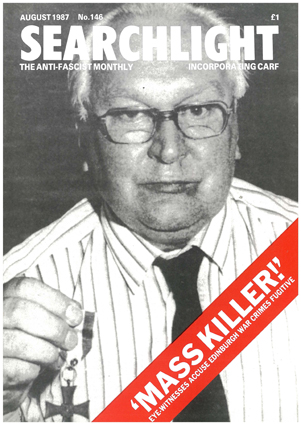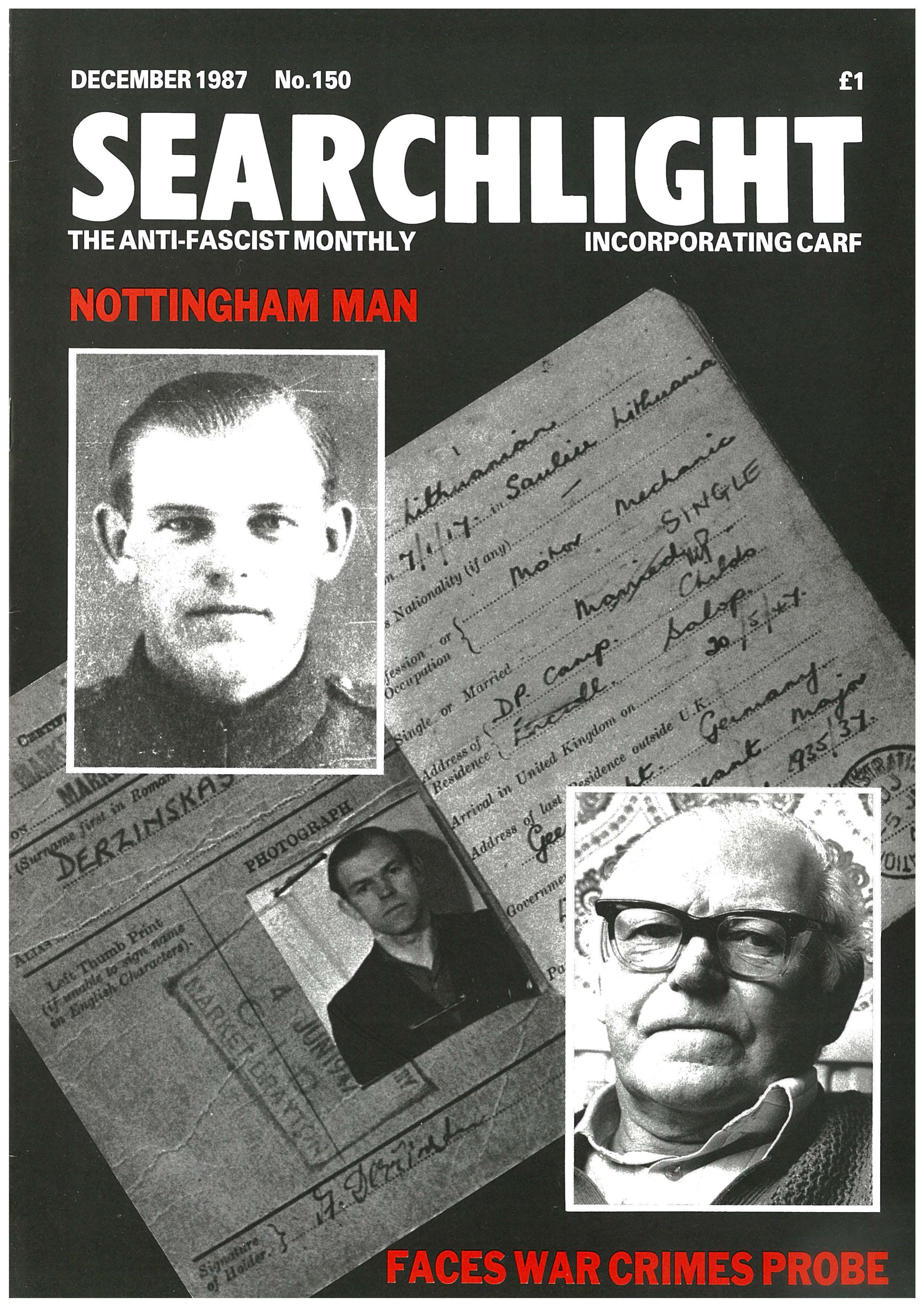Amassing evidence on Nazis who fled to the UK – Siobhan Hyland reflects on Searchlight’s investigations into Nazi war crimes more than 30 years ago, as part of a campaign to seek justice for victims and their families

Anton Gecas on the August 1987 cover of Searchlight, with articles inside on his war crimes and the diary of Searchlight’s visit to the Soviet Union to collect more information on nazi war criminals. The paperwork provides evidence of the involvement by Gecas and others in Nazi war crimes
There has been increased public and media interest in Second World War-era Nazi war criminals of late. For example, in 2019 Netflix released The Devil Next Door, which serialised the trial of John Demjanjuk, accused of war crimes at Sobibor extermination camp. Demjanjuk was said to have been ‘Ivan the Terrible’, a feared camp guard, who on witness testimony operated a gas chamber at Treblinka extermination camp.
However, there was doubt as to whether Demjanjuk was ‘Ivan the Terrible’. In terms of the trial, or trials, Demjanjuk died while serving a five-year sentence awaiting appeal. The twists and turns of the complicated and problematic trial are shown in The Devil Next Door.
Two years later, in 2021, BBC Radio 4 released The Nazi Next Door, which detailed the life of Stanislaw Chrzanowski, who was investigated by his stepson as a potential Nazi war criminal. The programme drew attention to the issue that Nazi war criminals may have made Britain their home and safe haven, so much so, that the Board of Deputies of British Jews called for an investigation.
These programmes demonstrate that there is still an interest in the events of the Second World War with public opinion driving the agenda to ensure justice is sought. This is coupled with the ways in which, publicly, Britain has memorialised the Holocaust, and its role in ending the Second World War.
The issue of Nazi war criminals living in Britain is therefore a complicated one: how can Britain, on the one hand, be proud of its role in ending tyranny in Europe but, on the other, have provided a safe haven to the perpetrators and collaborators of the Nazi war machine?
Despite this interest and wider publicity, what is less known is that decades earlier, in the 1980s, Searchlight, along with the Union of Jewish Students (UJS), with the support of trade unions, launched its own campaign against Nazi war criminals, driven by a sustained investigation that took Searchlight across the globe and saw it creating a transnational network of information sharing that took the investigative campaign right to the heart of parliament.
Hiding in Edinburgh
This article looks back through the Searchlight archive, to detail the hard work undertaken by those who fought, decades ago, to bring this issue into the light.
Searchlight magazine, when it was launched in 1964, always published articles about Nazi war criminals who were hiding in other countries. It watched with interest and published articles about Nazi war criminal Klaus Barbie, who was investigated by the famous Nazi hunters Serge and Beate Klarsfeld.
In early 1986, someone – and we at Searchlight are not exactly sure who – handed Andy Bell a faxed press release from one of the Soviet bloc news outlets – probably the newspaper Izvestia – claiming that one such war criminal, Antanas (Anton) Gecas, previously known as Gecevicius, had settled in the UK and was now living somewhere in Scotland.
Andy was then working for television and showed the fax to his producers but, for various reasons, they were not inclined to pursue it. Andy then sent it to Graeme Atkinson, who was covering international stories for Searchlight at the time, who filed it away.
In November 1986, working at that time in Glasgow, Graeme heard on the news that the Simon Wiesenthal Center (SWC), based in Los Angeles, had given the British government a list of 17 names of individuals accused of war crimes, who had found refuge in the UK.
Graeme remembered the fax. He had it dug out from his files at home and sent up to him, and he then took it to the Scottish Daily Record. The paper investigated the claim and, shortly afterwards, ran a story about the SWC dossier, which did not name Gecas but, with our document as its source, stated that one of the 17 accused was living in Edinburgh.
This in turn aroused the curiosity of a reporter from Scottish TV News: Bob Tomlinson produced The Daily Record article at the STV News daily editorial conference the following morning and was given the go-ahead to look into the story further. A few days later, STV ran a report naming Gecas, a Lithuanian exile living in Newington, Edinburgh, whose neighbours had no clue that they had an alleged war criminal in their midst. We at Searchlight followed up the story in the December issue of the magazine.
Proof positive
Due to the political climate of the 1980s, the SWC was not able to gain access into the Soviet Union to verify particular elements of evidence. However, Searchlight was.
One of our most successful pieces of work was done in the summer of 1987, when Searchlight journalists Gerry Gable and Sonia Gable, with the support of Soviet prosecutors, spent 10 days visiting and researching sites of potential war crimes and interviewing family members of victims in the Soviet Union.
This was all detailed and serialised as a diary in the August 1987 magazine, with the front-page headline, ‘Mass Killer! Eye-witnesses accuse Edinburgh war crimes fugitive’. This banner in red and white and against the background photograph of Gecas, who was accused of mass killings in Lithuania and Byelorussia when he served in a police unit. Searchlight stated that because of this fact-finding mission, and the support to Gerry and Sonia given by the Soviet Union, they had proof positive that he had committed war crimes.
Searchlight began the diary entry on 1 July 1987 in Moscow. On that day, our two journalists met with Natasha Kolesnikova, Senior Prosecutor for the Department of Justice. She was responsible, along with her assistant Vitaly Dyukovlev, for the investigation of war crimes. Gerry and Sonia met with them for two hours, during which they outlined the sheer scale of the investigation. Kolesnikova stated that a huge corpus of documents had been sent to various governments in the west. She also stated that part of these documents had gone to Britain, but that the British government was unwilling to work with Soviet prosecutors.
Most importantly, at the end of the meeting, Gecas was discussed. Kolesnikova stated that, if Britain did not want to extradite him to the Soviet Union to face justice but would put him on trial on British soil, this was a compromise they could live with.
Minsk, Belarus
On 2 July, Gerry and Sonia visited Minsk and stayed for three days. They started their diary entry by describing the ways in which Minsk had suffered at the hands of the Nazis and the collaborator police battalions. To add context, 90% of Minsk had been destroyed before the city was liberated. It had taken until the 1980s to restore the pre-war level of population, and even longer in other parts of the country.
There was some light relief during their search for war crimes, as Gerry and Sonia got to see the anniversary of the city’s liberation, with music playing in the street and a carnival atmosphere. This helped them get through their time there, as they delved into war crimes with chief prosecutor Georgy Tarnavski. He discussed the Lithuanian death squads, who were at times deemed to be much worse in their conduct than the German Nazis.
One of their most treasured memories, as recorded in the article, was of meeting Anna Trusova. She was the daughter of Kyril Shein, hanged by Gecas’ unit for assisting partisans. The image of Shein has become iconic of the atrocities committed across European society, not only of Jews, but all who had stood against the Nazis. Finally, the Gables went to Ratomskaya Street, where Jewish women and children had been massacred in March 1941 and buried in a mass pit.
Vilnius, Lithuania
Our reporters moved on to Vilnius on 6 July, where state prosecutor Jurgis Bokchonis passed over a new case to work on. It was that of Antas Derzinskas, who was alleged to have murdered Jewish women and children and a trade unionist, the latter on the morning of the day Derzinskas had fled and made his way to Britain.
Due to the support Searchlight received, the case on Derzinskas grew, and he was the front page of the December 1987 magazine. A joint team from Searchlight and the Nottingham Evening Post tracked him down to Nottingham. Derzinskas was accused of helping in the transport of 70 Jewish women and children to their deaths in Gruzdžiai. Searchlight handed over a fuller dossier of material to the Home Office, in the hope that this would pressure it to look at his case.
Riga, Latvia
Back to the Soviet trip, on 7 July, the next stop was Riga, which gave the Gables pause for thought. According to the Prosecutor’s Office, they were the first from Britain to come investigating war crimes. Although there had been visits from the USA, Canada and Australia, there had been none from Britain until Searchlight. They were supported in detailed reports of Latvian Nazi war criminals in Britain, which only strengthened their many cases.
Moscow
The final day of the trip was 8 July, with the ultimate destination Moscow. The Gables spent the day with Soviet journalists, discussing the ways in which they could expose Nazi war criminals living in Britain.
Searchlight posed the question about why there was no Soviet discussion of Kurt Waldheim, who was shown to have been involved in war crimes. Searchlight left its special issue magazine on Waldheim and hoped this would be used to question the Soviet government into action. Gerry and Sonia left the Soviet Union with the resolve to try to bring justice for all who had died there, and not allow Britain to be a safe haven for their killers.

Information on war criminal Antas Derzinskas, another Nazi fugitive living in Britain, was given to Searchlight in Lithuania. The December 1987 issue of the magazine reported on the charges and evidence against him
UK campaign
Due to the information sharing brought about through this trip, Searchlight had what it needed to launch an official campaign, which we did in October 1987.
The press conference was scheduled for 12 October in London and then a public meeting in Manchester on 13 October. This was followed up on 25 November with a lobby of parliament. Searchlight detailed the support it received in the November 1987 edition of the magazine, reporting that 400 people had attended the Manchester event. The magazine also went on to say that smaller meetings spread through the country – Cambridge, Liverpool, Hull, Leeds, Peterborough and Swansea, among others. The news that Nazi war criminals were living in Britain was spreading.
But Searchlight did not stop there, creating dossiers of investigative material to give to MPs to pressure the government into action. There was no legislation to deal with war crimes committed abroad, so first Searchlight pressed for the government to look into deportation for the suspects. What helped Searchlight’s cause is that an All Party Parliamentary Group on War Crimes was set up by MP Greville Janner, with cross-party support, and began campaigning within government for action.
The government was being pressed from all angles – within government, by Searchlight and the UJS, along with the mainstream media – finally, in 1991, the War Crimes Act came into being. The Act meant that retrospective crimes, committed abroad by citizens of other countries, who now lived in Britain, could be prosecuted. That should have been the end to the Searchlight story and the beginning of justice …
Justice now!
To date, there has only been one successful prosecution of a Nazi war criminal in a British criminal court, Antony Sawoniuk, in 1999. He was charged and prosecuted on two counts of murder and sentenced to five years in prison, where he died in 2006.
At the height of police investigations, up to 300 suspects were being investigated. Searchlight pushed for all those who had been accused of war crimes to face justice and, although this has not happened, our campaign stands as a marker in history in the push for justice, as soon as it was known that Nazis were in Britain.
Searchlight’s contribution was vital in the pursuit of justice, as we were part of a grassroots campaign of committed people, determined to right the wrongs of the past. To understand the Searchlight War Crimes Campaign is to understand the full implications and problematic nature of this enterprise overall.
The importance of this article, in looking back into Searchlight archive is to celebrate our brave and intrepid journalists, the support from the UJS and many others, in the quest for justice that must not to be delayed anymore.








